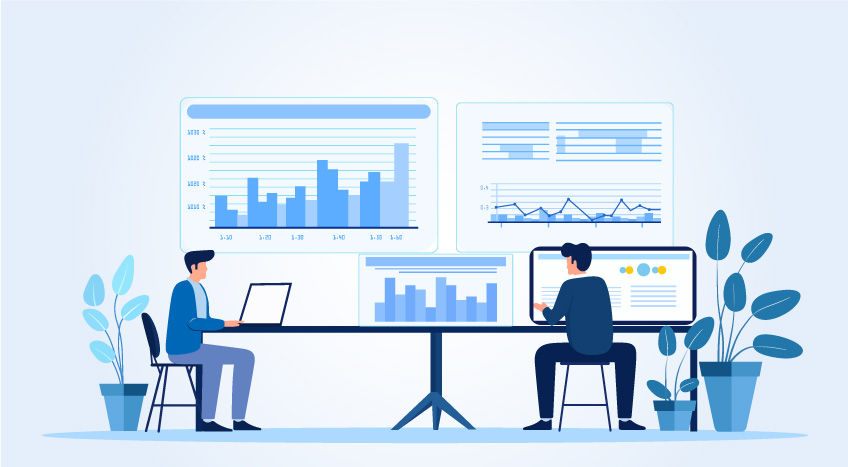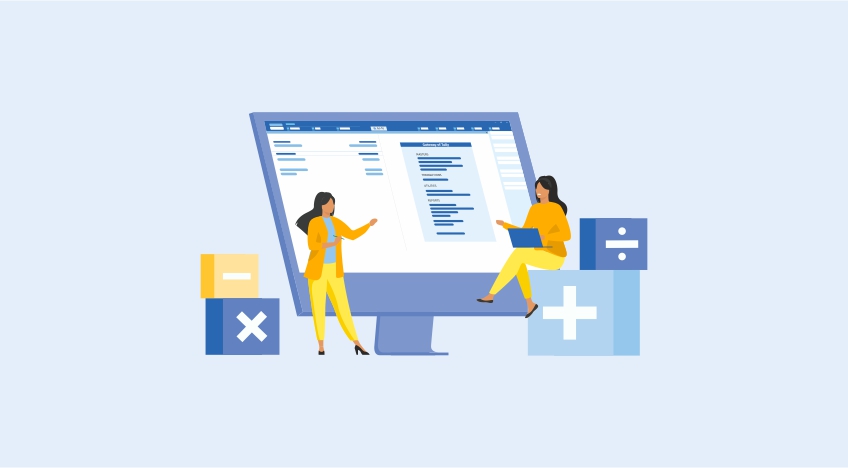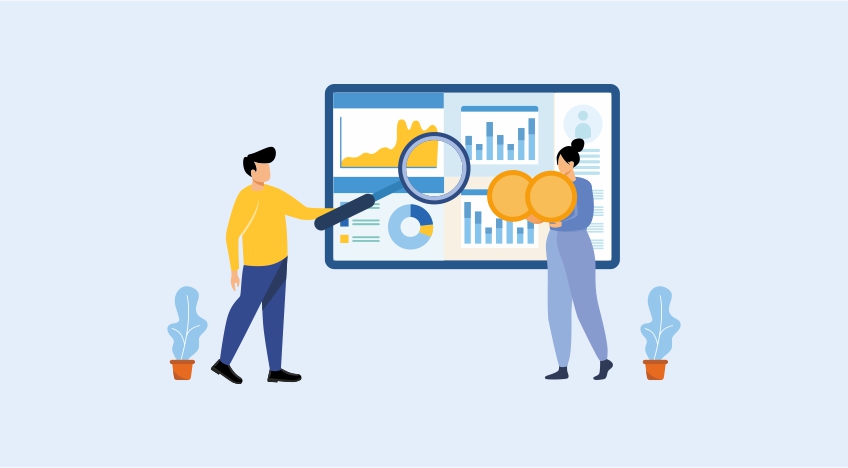Choosing the right business software to take care of your organisational needs could be quite daunting. When a business owner starts a company, he/she already has certain plans in place to help reach the desired target. Selecting from a list of business software available in the market is one of the key decisions an entrepreneur must take to ensure optimum business efficiency. The best business management software solutions return a long-term benefit and accelerate your company’s growth. There are several standard questions to be asked when selecting any software product for your organization. In this article, we will help you understand some key areas and identify questions, you need to ask yourself while selecting the right software for your business.
What kind of a software do you need - Online and On-Premises?
With so many varieties and options available in the market, it can be quite intimidating to choose a software solution for your business. Based on the needs of your company, you can take a call as to which option would be best suited to meet your organisational goals. Your demand of a particular software would vary from business to business, thus, identifying your long terms goals will help you choose the right software for your company’s benefit. While in some cases on-premise software would be a better option, for others online would make more sense. Ultimately it depends on how well connected or technologically sound your business is. On-premise software wouldn’t have to deal with contingencies like poor internet connectivity, leading to a poor experience, flawed security, delay in generating reports, etc. It’s common for business owners to jump at every deal they get, so stay grounded and identify what you truly need first. In fact, if you are not sure, you're not ready to buy. It can be an educational experience to see what vendors in the marketplace are offering and then take a call accordingly.
Adapting to your business V/S business adapting to software
There is a fine line between what you need from a software and what the software is offering you. Often so there are products available in the market which may seem to cater to your business needs at a certain point but aren’t flexible enough to adapt to the evolving environment. Every business grows over the years and it’s imperative that the software you choose also evolves and acts as a growth accelerator to your business. For example, when you set up masters or record an invoice, the process of passing any transaction should be seamless. A software should allow you to be as flexible as you can and adapt as per the business conditions and not vice versa. The software which you choose for your business should be customisable as per your needs so that you can make the most of it, to be more precise, your software should be “designed for you”. It’s very important to try and quantify the benefits you’re expecting to gain from your new tool. The more specific you are, the more accurate you can be when researching prospective software solutions.
What kind of training or skillset would the team require while working with the software?
As a business owner it’s your responsibility to make decisions that are best for the team. While deciding on which software would be apt to add value to your business, you also need to keep a check on the time that your employees will have to invest to learn the tool. While Rome wasn’t built in a day, your software should follow the mantra of ‘simplicity’. The easier the tool is for your employees to use, the better will be the results. A simple business solution software ensures fool-proof outcomes in terms of managing cash flow, inventory, compliance and other crucial aspects in an organisation. Even if the software is a perfect fit, it’s very important that you scope out the resources required to implement the software. Some solutions can take months to integrate so you want to make sure you’re 100% squared away before locking your technical resources into a month-long project.
How well can the software handle exceptions?
In business timing is everything. Technology is changing every single day. What’s “state of the art” now may be obsolete in a few years. From new tax reforms to price fluctuations to demand and supply chain changes, nothing is constant in the business world. The larger your business grows, you start to seek more business information like profitable products, fast-moving products, ageing of the stock that is lying in the warehouse, ways/areas to optimise the cost etc. Missing customer information, improperly coded order fields, incorrectly allocated inventory, and data mismatches between customer and billing systems are just a few examples of exceptions that can happen in the typical course of business. Thus, a software must be flexible and intuitive enough to handle complexities. With information flowing across different stakeholders, business software you adopted should meet the contingencies that may befall you. A well-connected network with complete data security will be a wise option to choose for your business, as it eliminates any unnecessary information leakage causing disruptions.
How will the software help in scalability & incremental implementation?
This is one of the key questions you need to ask yourself while choosing a business software. Change is inevitable and so the software you wish to opt for must be there in your business’ long-term plan. For several companies, new software implementation could include 50–60 resources. This is big at the beginning, but corporations tend to hire more people every year, so in a few months’ time, the company might need to get 70 or even 100 resources. How well can your chosen solution adapt to such changes? To continuously adjust the solution to business needs, it is good to use flexible software that allows the adding of new features step by step. As you grow your business, your software should have the capacity to meet your needs and incremental adoption of new features must take the front seat.
How easy and accurate will my business and MIS reports be?
To run a business successfully, you must have a seamless process in place. With a powerful technology behind a software which has the capability to adapt to unthinkable business scenarios and generate accurate reports will be your best bet. One of the primary reasons why a business owner chooses to opt for software to manage his operations seamlessly, by automating manual tasks. Generation of accurate business and MIS reports will not only give an overview of the business’ performance but also shed light on its creditworthiness to respective stakeholders and vendors.
Will I get enough support from the software team?
Let’s say it’s zero hours with a major client. You’re frantically working through some numbers to ensure that you keep this client happy – and keep the account. You load up your accounting software platform, and… Nothing. What happens if your account becomes inaccessible, your software malfunctions or something else goes haywire? These are the points where support becomes an essential aspect of whichever accounting software you choose. You’ll want to keep an eye out for the following support options:
- Included support: You need to make sure that the software includes worthwhile, ongoing support
- 24/7 availability: Inopportune moments can arise at any given point irrespective of the time or day. To stay on top of your game even in such unprecedented times, opt for companies that provide the support you need any time you encounter these types of issues
- Comprehensive knowledge base: A well-organised and intuitive knowledge base can allow you to quickly search for a problem you may be encountering and find a solution. In many cases, you can find and resolve any issue much more quickly than working with a live customer service representative.
Comprehensive business software is the one that caters to all these needs. While choosing from numerous software might seem challenging, but to ensure that you do not regret your decision later or face any difficulties later, it’s wise to keep this checklist handy. Tally.ERP 9’s capabilities allow you to use the software the way you want to and walk alongside your business as it grows. Why don’t you give TallyPrime a try and experience seamless management of your business right away?
Explore more Products
Accounting Software, Inventory Management Software, Payroll Software, Financial Management Software, Invoicing & Billing Software, Business Software for Small Businesses & Start-ups
Read more about TallyPrime
What is TallyPrime?, TallyPrime’s ‘Go To’, Tally Prime’s Amazing Invoicing Experience, New Edit Log Feature in TallyPrime, Tally’s Exception Reporting to Address Data Anomalies, TallyPrime’s Simplified Security and User Management System, Multitasking Just Got Easier with TallyPrime, TallyPrime – Simple to learn and easier to use, 5 Things in TallyPrime for Enhanced Business Efficiency, 5 Things You Can Do Using Save View Option in TallyPrime
Read more about Business Software
Integrated Business Software Vs Separate Software Tool for Each Module, How Do You Evaluate the Cost Effectiveness of a Business Software?, Why is it Important to Choose a Software that Grows with Your Business?, Financial Accounting Standards, Personalise the Business Reports the Way You Want, Business Entities in Indonesia










